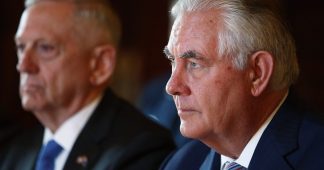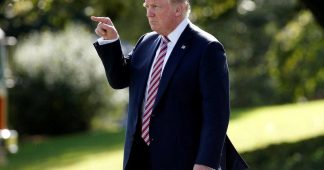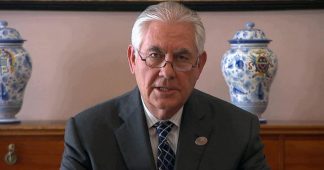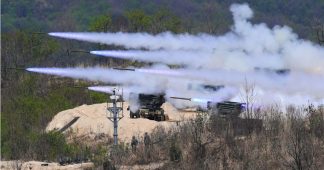By Peter Symonds
5 October 2017
Barely concealed divisions in the Trump administration over foreign policy were again exposed yesterday. Secretary of State Rex Tillerson was forced to address a well-sourced NBC report that he called Trump “a moron” at a meeting at the Pentagon of top Trump officials in July and was on the verge of resigning.
In careful comments to the media, Tillerson denied he considered resigning and rejected the suggestion that Vice President Mike Pence and other officials persuaded him not to do so. He brushed aside, but did not deny, calling Trump a moron at the Pentagon meeting, and went on to praise the president and his foreign policy.
Notwithstanding concerted efforts by Tillerson, Trump and various administration spokespersons to downplay any breach, the secretary of state has been publicly at odds with the president—most sharply over the intensifying drive to war against North Korea.
In an extraordinary rebuke to Tillerson last weekend, Trump declared the secretary of state was “wasting his time” by telling reporters he was exploring the possibility of talks with North Korea to defuse the dangerous confrontation on the Korean Peninsula. Trump’s outright repudiation of negotiations with Pyongyang was not only a slap in the face to Tillerson but to the Chinese leaders, with whom Tillerson had just held talks.
Whatever differences exist between Trump and Tillerson are purely tactical. Tillerson is just as committed as Trump to waging war against North Korea if it fails to accept US demands to abandon its nuclear arsenal. Nevertheless, given the enormity of a conflict that could cost the lives of millions and plunge the world into war, he has held open the possibility of negotiating an agreement with North Korea to denuclearise.
By ruling out talks with North Korea, Trump appears to be already committed to the path of provocation and a war that would, as he warned at the UN, “totally destroy” a country of 25 million people. Trump declared in his tweet last weekend to Tillerson: “Save your energy Rex, we’ll do what has to be done.”
In testimony to the Senate Armed Services Committee on Tuesday, Defence Secretary James Mattis cautiously defended Tillerson, saying he “fully supported” the secretary of state’s “efforts to find a diplomatic solution but remains focussed on the defence of the United States and our allies.”
When asked about Trump’s dismissal of negotiations as a waste of time, Mattis attempted to minimise the divisions in the administration. Tillerson was only “probing for opportunities to talk with the North,” Mattis said. “We’re not talking with them, consistent with the president’s dismay about not talking with them before the time is right.”
Nevertheless, Mattis also tacitly set himself against the president when he told the same committee hearing that he supported the 2015 agreement with Iran to severely restrict its nuclear programs. “If we can confirm that Iran is living by the agreement, if we can determine that this is in our best interest, then clearly we should stay with it,” he said.
Trump has repeatedly denounced the Iran deal, declaring it to be one of the nation’s “worst and most one-sided transactions” ever. The US has called for it to be renegotiated—a step opposed by other signatories, including key European allies, Britain, France and Germany, that have invested heavily in Iran.
While the US Congress eventually agreed to the 2015 deal, it required the US president to certify every three months that Iran was in compliance with the terms of the agreement. According to the Washington Post, Trump is preparing to deliver a major policy speech on Iran next week ahead of the next deadline for recertification on October 15.
If Trump declares Iran not in compliance, the US Congress could then re-impose crippling sanctions, effectively scuttling the deal. Such a move would fly in the face of the International Atomic Energy Agency’s determination that Iran is complying and would dramatically raise tensions not only with Tehran but with major European powers, as well as Russia and China.
Three months ago, Trump threatened not to recertify Iran’s compliance but was reportedly talked out of doing so by his top advisers, who offered a face-saving device. The Washington Post indicated that Tillerson, Mattis and others were attempting to do the same again. Tillerson told reporters yesterday: “We’ll have a recommendation for the president. We’re going to give him a couple of options of how to move forward.”
Republican Senator Bob Corker, chairman of the Senate Foreign Relations Committee, underscored the deep divisions running through the Trump administration and the political establishment as a whole. Asked if he supported Tillerson, Corker declared yesterday: “As a team, Tillerson, Mattis and [White House Chief of Staff John] Kelly help separate us from chaos, so I absolutely support them. Absolutely.”
If would be completely wrong to view Tillerson, Mattis, Kelly and others as some sort of anti-war faction in the American ruling elite. All of them back the criminal, ongoing wars in Iraq, Syria and Afghanistan and the accelerating preparations for war in Asia and Europe. Rather, as the US has confronted one debacle after another, divisions have opened up in Washington over the timing and conduct of new wars.
The bitter campaign over alleged Russian inference in the 2016 presidential election in support of Trump reflects sharp differences over whether Russia or China pose the greater threat to US global dominance. In the final analysis, the reckless and fascistic character of the Trump administration is the expression of the crisis of US imperialism as it desperately seeks to use its military might to arrest its historic decline as the expense of its rivals.
The political turmoil and upheaval in the White House is another warning that the US is careering toward another disastrous war on the Korean Peninsula. Having deliberately inflamed tensions through its repeated threats against North Korea, the Trump administration has created a situation where any incident—deliberate or accidental, major or minor—could trigger a conflict.











